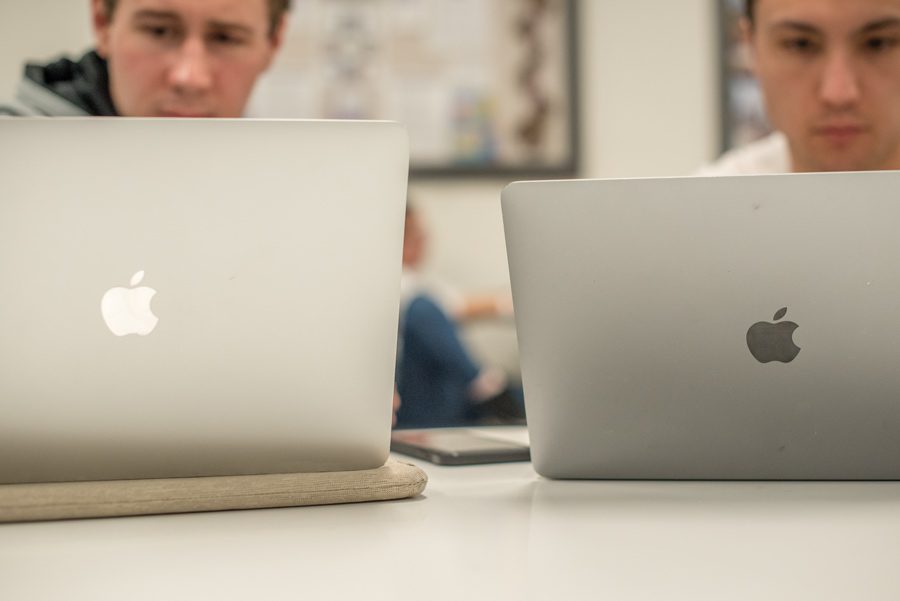Professors differ on laptop use in classrooms, as benefits of bans debated in new research
Evan Robinson-Johnson/The Daily Northwestern
Two Northwestern students working on their laptops. NU professors have mixed feelings on the use of laptops during lectures, some saying it distracts students
February 19, 2019
Some Northwestern students slip their computers into bags and backpacks without so much as a second thought, but the laptop — the ever-present symbol of on-the-go college students — and its role in the college classroom are still up for debate.
NU professors who ban laptops often cite a 2014 study that suggests writing notes by hand helps students retain information better than typing notes. However, a recent study published in the Educational Psychology Review found that there’s not a significant difference between typed and handwritten notes. In NU classrooms, this topic is contested.
Chemistry Prof. SonBinh Nguyen said he doesn’t allow laptops during lectures because he finds they distract students from the material.
“If you really want to learn a subject, you have to write it down,” Nguyen said. “You have to use the muscles in your hand to coordinate with the imprinting in your brain.”
Nguyen added that for STEM majors, handwritten notes can be important because much of the material consists of drawings and diagrams, which require pen and paper.
However, some NU professors allow laptops in their classrooms because of their practical benefits. Sociology Prof. Marshall Jean said laptops shouldn’t be blamed for distracting students, and the benefits of typing notes more than make up for any potential pitfalls.
“Electronic notes are easier to save, easier to search and easier to share,” Jean said. “Certainly students can be distracted by it, but that’s something I allow them to manage themselves.”
Jean added that small distractions can be beneficial, since it can be difficult for some students to focus for an entire 80-minute class. Just like doodling, small distractions on laptops could be a way for students to manage their attention to increase overall productivity, Jean said.
Weinberg junior Luke Cimarusti said laptops can be extremely distracting for students not even using their laptops. He said he remembers sitting in past classes where he couldn’t ignore a student sitting in front of him scrolling through Twitter during lectures.
“I exclusively use notebooks, and I like to draw in them,” Cimarusti said. “It really helps me to focus when I can draw visual aides.”
A study published in March 2013 found that students who multitasked on a laptop during class and students who were in direct view of the multitasking student scored lower on a test compared to students who didn’t.
Kyle Kaplan, a fifth-year doctoral student in musicology and a Mellon Interdisciplinary Cluster Fellow with the gender and sexuality studies program, said he doesn’t allow laptops when teaching. Kaplan, a teaching assistant for the gender and sexuality studies department, said a classroom should be “a place to develop a new skill set” and that if a professor requires handwritten notes, it is an opportunity for students to practice a skill set that might otherwise go unused.
“So much of it isn’t about individual student learning but about the community as a whole,” Kaplan said. “In small classes you can do that a little bit more … but it’s a disciplinary thing in the sense of how you create the most focused learning environment.”
Some NU professors and graduate students are able to find a middle ground in the debate.
Grace Kessler Overbeke, a sixth-year doctoral student studying theatre and drama, said she allows her students to use laptops to access readings and other course material during lecture but prefers that students take handwritten notes.
Nguyen said he uses an honor code when students want to bring technology into the classroom, asking that they disconnect their devices from the internet.
The University does not have an official laptop policy for classrooms, allowing each professor to tailor rules as they see fit. Jean said he allows students to choose their own styles of note taking.
“I don’t know people’s learning styles,” Jean said. “Rather than make one policy that everyone can’t use laptops, I allow students to make those decisions themselves.”
Email: [email protected]
Related Stories:
– SES laptop loan program ends, but NU Libraries offers similar program


